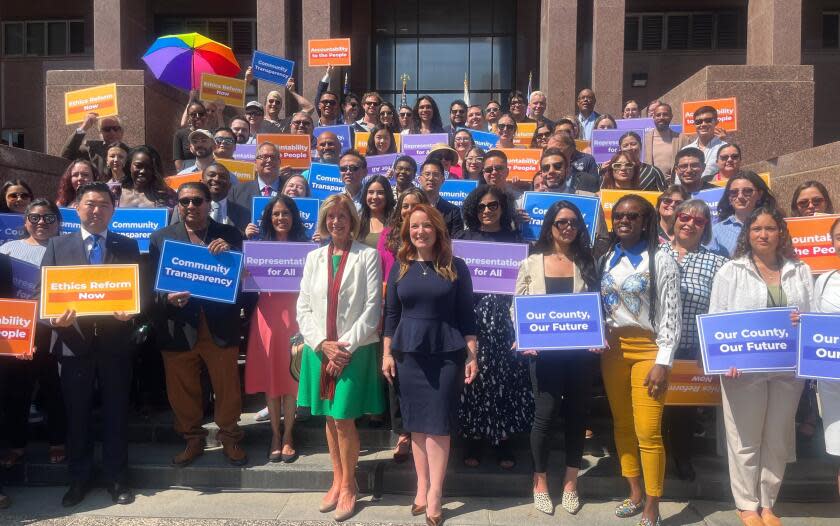Should L.A. County expand to nine supervisors? Voters may decide in November

Voters could be asked to dramatically reshape how Los Angeles County is governed by nearly doubling the size of the Board of Supervisors and creating an elected position to oversee day-to-day operations.
On Wednesday, Supervisors Lindsey Horvath and Janice Hahn announced the proposal, which would require approval by the five-member board to get before voters in November.
Horvath, the newest member of the board, said she has become convinced in her first year in office that five supervisors cannot effectively represent a population larger than most states. Each supervisor oversees a district of about 2 million people.
Under the proposed charter amendment, the number of supervisors would increase to nine. The county chief executive, who manages the county government and oversees its budget, would be elected by voters instead of appointed by the board. And the county would create an independent ethics commission to root out corruption by officials.
The proposal would require the supervisors, sometimes referred to as the “five little queens” because of their unglamorous but powerful jobs governing the nation's largest county, to give up some of their individual power as their districts shrink to accommodate more colleagues.
It could also result in a more racially diverse board in a county that is nearly 50% Latino. The current board is all female, with three white supervisors, one Latina supervisor and one Black supervisor. L.A. County has never had an Asian American supervisor.
“The last time the county meaningfully changed its form of governance was in 1912, before women had the right to vote,” Horvath said at a sweltering Wednesday news conference. “These [changes] are not radical. They are long overdue.”
In 1912, the year voters adopted a charter, L.A. County's population was about 500,000. It is now 10 million.
Horvath and Hahn said they plan to introduce a motion on Tuesday directing county lawyers to draft an amendment to the charter that could be put on the November ballot.
Two of their colleagues, Supervisors Hilda Solis and Holly Mitchell, have previously introduced proposals aimed at changing the county's governance structure, albeit at a slower pace.
There are no estimates for how much the changes could cost, Horvath and Hahn said Wednesday, though they vowed that residents' taxes would not go up to pay for the overhaul, which would necessitate additional salaries for the new supervisors. Each supervisor makes about $280,000 a year.
It’ll be a tight race to get the charter amendment on the November ballot. If the motion passes next Tuesday, it must come back to the board twice more for votes on the language. Horvath’s spokesperson, Constance Farrell, said the plan is for those votes to take place July 30 and Aug. 6.
The final board vote would have to happen before Aug. 9 to make the November ballot.
The full-tilt timeline, if successful, would stand in stark contrast to the city of L.A.'s more plodding process for charter reform. In June, the City Council voted to create a citizen's commission that would look at expanding the size of the council, among other changes. The earliest the proposals could go before voters would be November 2026.
“The county has completely and totally leapfrogged the city,” said Fernando Guerra, director for the Center for the Study of Los Angeles at Loyola Marymount University, who submitted research to the city for its charter reform efforts. “Kudos to the county for not bogging it down by studying it to death.”
Although the timeline to get the measure on the ballot is short, the idea of overhauling county government dates back decades. Since 1970, numerous studies have looked at how to make county government more representative, with many recommending an elected executive or more supervisors.
"The main items have been proposed for decades ... and I mean many decades," said Raphael Sonenshein, executive director of the Haynes Foundation, which funds research on governance in greater Los Angeles. "It looked like it had pretty much stalled."
Even if the measure gets on the ballot — and voters support it — it could be years before the biggest changes are realized. The deadline to create an independent ethics commission would be 2026, according to the motion. The county chief executive would be elected by 2028. The nine-supervisor structure would not start until 2032, following a redistricting process.
Voters, typically uneasy about the idea of paying more politicians, have spurned the idea of expanding the Board of Supervisors eight times since 1926. Most recently, in 2000, 64% of voters rejected increasing the board to nine.
“This time is different,” said Hahn, noting that her father, longtime supervisor Kenneth Hahn, had pushed for similar reforms.
Horvath's office provided reporters with a poll conducted for the county by the firm FM3 Research, which surveyed about 850 likely voters. Roughly nine of 10 said they believed there was a “need for reform.” Three out of four said they would support a measure to expand the board.
The poll also suggested strong support for some of the smaller changes Horvath and Hahn want to make, including requiring that county departments present their budgets in public meetings and barring former elected officials and staff from lobbying the county for two years after leaving office.
“The timing may be right for this,” said Zev Yaroslavsky, who supported board expansion during his two decades as a county supervisor. “There’s much more public attention on governance than there has been in the last half century.”
This story originally appeared in Los Angeles Times.


